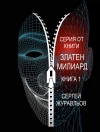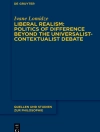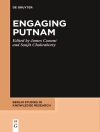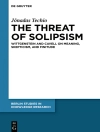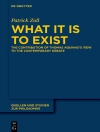This book provides a detailed reassessment of the role and impact of analytic philosophy in the overall philosophical debate. It does so by focusing on several important turning points that have been particularly significant for analytic philosophy’s overall history, such as Bertrand Russell’s critique of Meinong, and the vindication of Heidegger’s famous ’Nothing’- sentence. In particular, the book scrutinizes whether the theses written about such points have been convincingly argued for, or whether they have gained attraction as a type of rhetorical device. Due to its broad nature, this book is of interest to scholars interested in all aspects of philosophy, at both graduate level and above.
Innehållsförteckning
Preface.- 1. Introduction.- 2. From Hegel to Kaplan.- 3. What Is Alive and What Is Dead in Russell’s Critique of Meinong.- 4. Heidegger’s Logico-Semantic Strikeback.- 5. Descartes Errs (But So Do We All).- 6. Is the Causality of Mental States Really not Negotiable?.- 7. Wittgenstein, Kripkenstein, and Meaning Experiences.- 8. The Fall from Grace of Philosophy as Conceptual Analysis.- 9. Conclusion.- Index.
Om författaren
Alberto Voltolini (Ph D Scuola Normale Superiore, Pisa 1989) is a philosopher of language and mind whose works have focused mainly on fiction, intentionality, depiction, and Wittgenstein. He is currently Professor in Philosophy of Mind at the University of Turin (Italy). He has had scholarships at the Universities of Geneva and Sussex. He has been visiting professor at the Universities of California, Riverside (1998), Australian National University, Canberra (2007), Barcelona (2010), London (2015), Auckland (2007, 2018), and Antwerp (2019). He has been a member of the Steering Committee of the European Society for Analytic Philosophy (2002-2008) and of the Board of the European Society for Philosophy and Psychology (2009-2012). His publications include
How Ficta Follow Fiction (Springer, 2006), as well as the “Fictional Entities” and the “Fiction” entries (with F. Kroon) of the Stanford Encyclopaedia of Philosophy, and
A Syncretistic Theory of Depiction (Palgrave, 2015).


